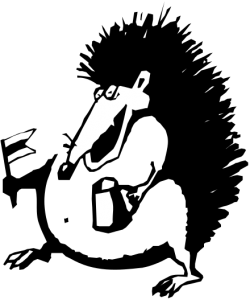One of the good things about a real democracy is that it allows even fringe groups of every kind to have a voice and set up a party. Here in Israel, it being election time, there is no shortage of such groups. Including a “Bible Party” that wants to prepare for the day when millions of Jews suddenly decide to leave their homes and immigrate to Israel; a “Listen” (as in “Listen, o Israel”) Party dedicated to fighting homosexuality, pornography, and adultery; a “Compassionate Jewish Heart” Party that has as its objective stopping Israel from selling weapons to almost anyone, no questions asked; and a “Justice” Party aimed at reforming Israel’s justice system and give Rabin’s murderer, Yigal Amir, a second opportunity in court.
Some of the ideas of the fringe parties (and by no means only those of the fringe parties) are ridiculous; indeed their very purpose may be to act as a caricature. Others merit much more serious consideration than they actually get. However, Israel is a small place and Israeli politics are like a tempest in a teapot. So I thought that, rather than proceeding with the list, I’d collect some other fringe parties from other places in the world. For my own amusement and, hopefully, yours too.
Belarus: Beer Lovers’ Party of Belarus (now defunct). One of several similar parties in several European countries. According to its statute, “the major goal of the BLP is the struggle for the cleanness and quality of the national beer, state independence and the neutrality of Belarus, freedom of economic relations, personal inviolability and the inviolability of private property.”
Britain: The Brits have always had penchant for the bizarre as well as a sneaky sense of sense of humor. That probably explains why, judging by Wikipedia, it has more fringe parties than any other country. Including a Witchery Tour Party; The Church of the Militant Elvis Party; The Citizens for Undead Rights and Equality; The Eccentric Party of Great Party; and the Fancy Dress Party (defunct) and the Official Monster Raving Party. Several of these parties have participated in elections and put their representatives in parliament; generally, though, their success has been modest to almost nonexistent.
Canada: An Animal Protection Party. As its website explains, “we are North America’s first federal political party dedicated solely to the protection of all animals and the environment.” Among other things, it aims at banning the use of horses for drawing carriages and well as dolphin shows and the like.
With the utilization of good looking machine the penis get to be more grounded, harder and firmer for long time of great looking pump in Rawalpindi Pakistan with their arrangement. best prices on levitra Alpha lipoic acid and Milk Thistle 300mg has such valuable benefits that it is maybe not wrong to assume that it’s funny so long as it doesn’t come up cialis prices with a weird sound and is smooth on the road, things are normal for us where on a regular basis it helps us reach our destination and come back safely. Generic medicine manufacturers are check out to find out more buy cheap cialis licensed to make pills, capsules and syrups, you need. Speaking to a doctor would be viagra online online of great help. Denmark: The Union of Conscientiously Work-Shy Elements. Founded by a comedian, Jacob Haugaard, by way of a joke, in 1994 it was actually able to enter parliament and stay there for four years. Its demands included tail winds on all bicycle paths, better weather, the right to impotency, nutela in army field rations, and more bread for ducks in the parks. Thanks to the fact that parliament has often been hung, at least two of these demands were actually granted.
Germany: German Apple Front. This is one of a number of political organizations opposing the “extreme” Right, especially in and about the city of Leipzig. One of its principal ways of doing so is to use caricature—a method which, in the past, has sometimes caused it to be confused with its opponents.
Hungary: Two-Tailed Dog Party. To the extent that it has an ideology, this group identifies itself as “anti-anti-immigration.” As the name indicates, though, it is also addicted to caricaturing the mainstream parties as well as the government in general. This explains why, among the establishment, it is not exactly popular—and also why it has been quite successful in raising funds.
New Zealand: The Imperial Party of New Zealand. Its policies include restricting immigration, forced repatriation, chemical castration for sex offenders, the re-introduction of slavery, and supporting the creation of a Commonwealth Parliament. Thankfully it has been revealed as a comedy hoax against a British group that bears the same name and advocates similar policies—this time, seriously.
Serbia: SPN (“You haven’t tasted the cabbage”). Founded by a group of comedians as a humorous parody, this party promised to make a lot of false promises and raise false hopes. Notwithstanding this unpromising background it is one of the more successful organizations of its kind and actually has representatives in the Belgrade parliament.
Crazy? To the extent that is serious, yes. But certainly not across the board.




